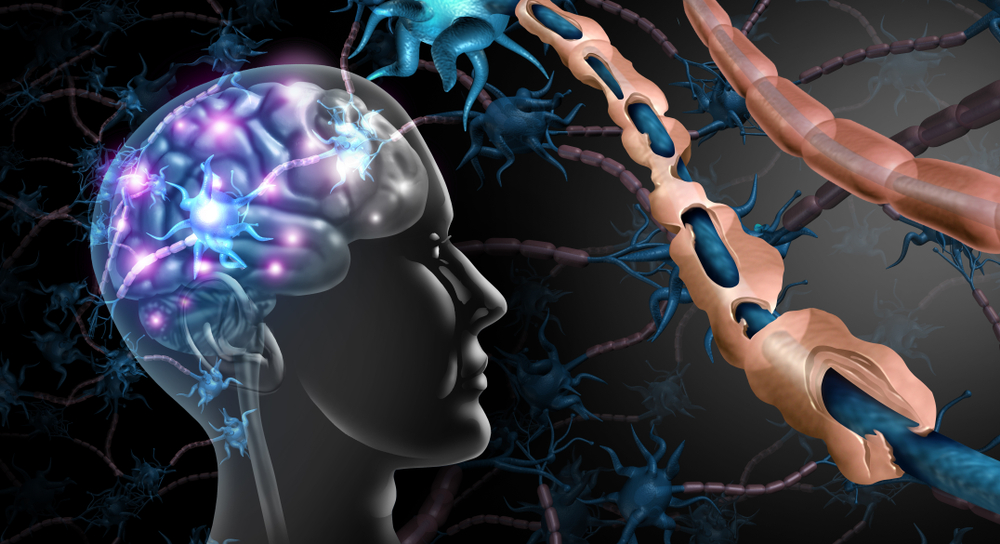Multiple sclerosis (or MS) is a serious and potentially disabling condition affecting the central nervous system. Within the nervous system, a complex set of nerves essentially controls all bodily functions, including mobility and brain activity. When a person has MS, their immune attacks the myelin sheath (protective tissues surrounding the nerve cells). This makes it extremely hard for the brain to communicate with other parts of the body and can eventually cause permanent deterioration or severe nerve damage.
The signs of multiple sclerosis can vary drastically, depending on the specific nerves affected, as well as the level of damage. However, some of the most common symptoms include vision problems, weakness, muscle spasms, vertigo, numbness, pain, and incontinence. Since the disease impacts the nervous system, some people with MS eventually lose their ability to walk. There are many benefits of homecare to consider upon receiving a diagnosis.
MS is a devastating autoimmune disease, and unfortunately, there is no cure. That said, certain MS treatments can help modify the disease’s course and keep symptoms at bay. Like many others, you might be wondering What causes multiple sclerosis?
At Alliance Homecare in New York, our Multiple Sclerosis home care service is committed to helping individuals and their families navigate the complexities of chronic illness. Read on to learn about the causes of MS and whether it’s possible to reduce the risk of developing it.
Multiple Sclerosis Causes
There is no official known cause of multiple sclerosis. The progressive disease makes the immune system attack—and often permanently damage—its own protective nerve cells. This slows down messages that travel from the brain through the central nervous system and sometimes blocks them completely.
MS affects almost 2.5 million people throughout the world. Within the general population, a person’s risk of developing multiple sclerosis is about one in 875. While it’s unclear why the disorder affects some people and not others, medical researchers believe it might be a result of several factors.
Potential contributing factors to MS include an abnormal immune response, various environmental factors, lifestyle, genetics, and infection. Understanding what could be behind the disease might help you get the proper care you need to mitigate the symptoms. Here’s what you should know.
Abnormal Immune Response
Those with multiple sclerosis have an abnormal immune response that creates inflammation and damage throughout the central nervous system. Lymphocytes are white blood cells found in the nervous system, and they include T cells (short for T lymphocytes) and B cells (short for B lymphocytes).
These cells are crucial components of the immune system. T cells minimize inflammation during an immunity attack while activating B cells, which produce antibodies. In order for diseases to reach the nerves in the nervous system, they have to cross the blood-brain barrier (BBB), which protects the myelin. With MS, T cells are able to break through the BBB and enter the nervous system, where they cause more inflammation and nerve damage, all while making it harder for B cells to create antibodies.
Environmental Factors
A variety of environmental factors are associated with an increased risk of multiple sclerosis. The disorder is diagnosed more often in people who live further away from the equator (in colder, less sunny climates) than those who live close to the equator (in warmer regions with year-round sunshine).
Research suggests lower levels of vitamin D from reduced sun exposure may be a contributing factor. This makes sense, as the nutrient helps support immune system function. According to the National Multiple Sclerosis Society, those who are born in a high-risk geographic area but move to a low-risk area before age 15 have a lowered risk of developing MS.
Lifestyle
The National MS Society also reports that smoking might play a role in multiple sclerosis. Those who regularly smoke cigarettes have a greater chance of developing the disease. Not only that, but they typically have more severe symptoms and progress more rapidly than non-smokers. The good news is that quitting smoking might show its progression, whether a person stops before or after the onset of MS.
Obesity during childhood and early adulthood may also increase a person’s risk for developing multiple sclerosis. For this reason, the lifestyle factors that contribute to obesity, including lack of physical activity and unhealthy food choices, are thought to play a role in the disorder. Additionally, the inflammation associated with obesity might make some MS symptoms worse.
Genetics
Multiple sclerosis isn’t inherited, but you can have an inherent genetic risk for the disease. People with a close relative (such as a sibling or parent) with MS have a higher chance of developing the condition than the general population.
Those of Northern European descent are much more likely to have multiple sclerosis than people of African and Asian descent. Also, women have a higher risk of MS than men. Roughly 200 genes are thought to contribute to a heightened risk of developing the disorder, though it’s unclear exactly why a person’s genetics and ethnic background play a role.
Infection
Similar to other autoimmune diseases, some evidence suggests certain viral and bacterial infections may trigger MS or make the condition worse in MS patients. This includes chlamydia, herpes, upper-respiratory infections, urinary tract infections (UTIs), measles, Epstein-Barr virus (EBV), and staph infections.
Multiple Sclerosis Symptoms
MS can manifest in a number of ways. The symptoms vary from person to person, and as we mentioned, largely depend on the location of the affected nerves and the severity of the damage.
Common early signs of multiple sclerosis include:
- Vision problems, such as blurriness, double vision, pain with eye movement, or complete loss of eyesight
- Tingling or numbness in the limbs, face, or trunk
- Tremors (muscle spasm), cramping, or muscle stiffness in the back and legs
- Fatigue or intense weakness in the legs and other parts of the body
- Lightheadedness, dizziness, a spinning sensation (vertigo), poor balance, or coordination issues
- Chronic pain or bouts of acute pain
- Frequent urination or urinary incontinence
- Constipation, diarrhea, or complete loss of bowel control
- Cognitive issues, such as forgetfulness, memory problems, difficulty focusing, a shortened attention span, or perception problems
- Behavioral changes, such as mood swings, heightened stress, and depression
Vision problems, persistent muscle weakness, numbness, and dizziness are among the earliest symptoms of multiple sclerosis.
Multiple Sclerosis Home Care in NYC
Those suffering from MS may require specialized long-term care. They might need assistance getting to the bathroom on time, taking prescription medications as directed, getting in and out of bed, getting the recommended physical activity, or attending doctor appointments. Here at Alliance Homecare in New York City, we offer a range of dedicated in-home nurse care services for chronic illnesses, including multiple sclerosis and ALS home health care which requires similar support.
Depending on the nature of the disorder and the unique needs of the patient, we’ll develop a personalized care plan that works for the individual and their family. You may want to consider geriatric care. What is geriatric care? Geriatric care is a collaborative effort between caregivers and medical professionals. A plan might include care from a skilled RN (registered nurse), a compassionate home health aide, or both. We also offer in-home hospital care for those looking for a trusted alternative to acute hospital care.
Our team will work closely with your doctor to monitor the progression of the disease, address symptoms, mitigate complications, and reevaluate your care needs. If needed, we can assist with everyday self-care tasks and light housekeeping as well. Alliance Homecare is also proud to offer respite services for family members and other caregivers who need a break, either on an ongoing basis or for a single occurrence. And we’re always here to provide support for families as they navigate the uncertainties and stress of a multiple sclerosis diagnosis.
To learn more about the types of in-home care we offer in the NYC metro area, contact us at Alliance Homecare today.
External sources:
- https://www.nationalmssociety.org/What-is-MS/What-Causes-MS
- https://www.mayoclinic.org/diseases-conditions/multiple-sclerosis/symptoms-causes/syc-20350269
- https://jneuroinflammation.biomedcentral.com/articles/10.1186/s12974-019-1517-1
- https://pubmed.ncbi.nlm.nih.gov/30638421/
- https://www.nhs.uk/conditions/multiple-sclerosis/symptoms/
- https://health.clevelandclinic.org/4-early-signs-of-ms-you-shouldnt-ignore/
- https://www.nationalmssociety.org/Symptoms-Diagnosis/MS-Symptoms
- https://www.hopkinsmedicine.org/neurology_neurosurgery/centers_clinics/multiple_sclerosis/conditions/





